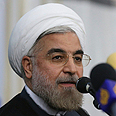
Rohani: Iran prepared for negotiations on nuclear issue
Iranian president hold news conference, addresses nuclear issue. Says way for talks on nuclear issue would open if US showed goodwill
Iranian President Hassan Rohani said Iran is prepared to enter "serious and substantive" negotiations on nuclear issue.
He added that confident concerns of both sides regarding the nuclear issue can be removed in a short time.
Related stories:
- Report: Rohani halted secret nuclear program in 2003
The solution to the nucler issue, he stressed, can be reached "solely through talks, not threats," noting he was "seriously determined" not only to resolve the nuclear issue, but also to preserve Iran's rights, among them the "undeniable right" to enrich uranium, and address the other side's concerns.
According to him, if the United States demonstrated goodwill towards Iran and an atmosphere of mutual respect was created, the way was open for talks to remove the concerns of both sides.
"What matters to us is the practical policy and strategy of the United States. If the United States shows goodwill and intentions ... and without any secret agenda, if they approach this way, then the way will be open," he told his first news conference as president.
"If the other party is also prepared like we are, then I am confident that the concerns of both sides will be removed through negotiations within a period which will not be very long."
Hopes for a diplomatic resolution to the nuclear issue have risen with Rouhani's victory over conservative rivals in June, when voters chose him to replace hardliner Mahmoud Ahmadinejad. A cleric whose watchword is "moderation", Rouhani is however still very much an Islamic Republic insider.
Last talks deadlocked
The last high-level talks between Iran and world powers - the United States, Russia, China, Britain, France and Germany - were held in April and failed to break the deadlock.
Since Rohani's victory at the polls, the United States has said it would be a "willing partner" if Iran was serious about finding a peaceful solution to the issue.
Adding to a sense of urgency and opportunity, Russia on Tuesday said fresh talks between Iran and world powers must not be delayed and should take place by mid-September.
Russian Foreign Minister Sergei Lavrov, speaking during a visit to Italy, said Russia "absolutely agreed" with Rohani, and criticized moves to tighten sanctions against Iran, saying it was a time for dialogue, not ultimatums.
"Now it is critical to support the constructive approach of the Iranian leadership," he said in comments carried on Russian news agencies.
Russian leader Vladimir Putin is due to meet Rohani for the first time as president in Kyrgyzstan in September.
In a letter to the new leader on Tuesday, the European Union said Rohani had "a strong mandate to engage in dialogue" and added that it hoped for a new round of talks "as soon as practicable."
Both the United States and European Union have imposed sanctions on Iran amid suspicions of its nuclear intentions, and Washington and Israel have said all options, including military action, are open to stop Tehran from acquiring nuclear arms.
Rohani criticized the embargoes, which have had a deepening impact on Iran's economy over the last year and a half as they slashed oil imports, the country's main source of income.
The measures have already cut Iran's oil exports by more than half compared to pre-sanctions levels of about 2.2 million barrels per day, helping to devalue Iran's currency and contributing to a steep rise in inflation.
"The goals of the sanctions in practice are piling pressure on various classes of the people," the president said.
"It is said (that) through sanctions they check Iran's nuclear activities. This is totally unfounded, and they themselves are cognizant of this fact ... It has nothing to do with the nuclear issue. It is pressuring people."
AFP contributed to this report
- Receive Ynetnews updates directly to your desktop










